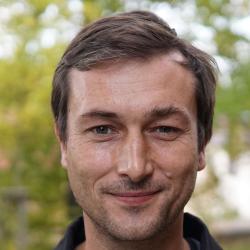Since we are all (?) sitting at home and waiting for the situation to improve, this may be a good chance to catch up with the latest literature. Alas, new papers are published without mercy every month, and March was no different. Here are the latest ones on paleoseismology., active tectonics, and large earthquakes. Stay safe!
more-
New papers on paleoseismology, earthquakes, and active tectonics (Apr 2020)
2020-04-02 | in Paper -
Tutorial: How to make a DEM from the Slovenian LiDAR data
2020-03-26 | in Software and Applications, Teaching | 6 responsesSince I can’t go to the field right now, I am stuck with analyzing the amazing LiDAR data from Slovenia. We have 1 m resolution data covering the entire country and oh my god it’s great for active tectonics research. But how do you actually make a DEM from the data? Here’s a quick guide using free software only.
more -
How to make a beautiful flow map
2020-03-19 | in Software and Applications, TeachingOK, this is a bit off-topic, but I was asked to write a short tutorial about how to make the flow map that I posted on Twitter. Why did I actually make it? Usually I am interested in faults and earthquakes, but sometimes secondary earthquake effects such as landslides can help us to find out about seismic activity. Since my next project will be about the Alps, I am currently looking a bit into landslides, too. The map shows a large landslide close to Jena, the Dohlenstein. This slide was activated several times in the past 300 years or so, but now seems to be stable. Behind the head scarp there is a small depression. I was wondering if this is perhaps just (paleo-)drainage, or if it could be the first hint for a new sliding plane and a larger future landslide. That’s why I made the flow map – if the depression has no outflow, it’s more likely to be related to newly forming tension cracks.
more -
Post-Doctoral Position in Morphotectonics / Structural Geology at CEREGE (Aix en Provence, France)
-
New papers on paleoseismology, earthquakes, and active tectonics (Mar 2020)
-
New paper: Tectonic activity of the Udine-Buttrio Thrust in NE Italy
2020-02-24 | in PaperIn my DFG-financed project “Earth surface response to Quaternary faulting and shallow crustal structure in the eastern Adria-Alpine collision zone and the Friulian plain” I investigate the active faults of NE Italy and western Slovenia. This project is part of the Priority Programme SPP2017 “Mountain Building Processes in 4D“. We’ve now published a paper on the activity of the Udine-Buttrio thrust fault. The paper is open access and available here.
more -
PATA Days in Chile 2020: registration & short abstracts due 28 February!
2020-02-13 | in PATA daysDear colleagues,
Please make sure to register for the 2020 PATA Days in Chile before 28 February here: https://www.patadayschile.cl
You can also book your hotels here and submit the short abstracts. There’s only a limited number of places due to the remote venue in a wonderful resort hotel – first come, first served. The PATA Days (Paleoseismology, Active Tectonics, Archaeoseismology) is the largest int’l meeting for the paleoseismology community and supported by INQUA. In Chile, a lot of tsunami science will of course also happen.
-
New papers on paleoseismology, earthquakes, and active tectonics (Feb 2020)
2020-02-03 | in PaperThis is the first paper round-up of the year and I think it’s perhaps a new record. So many studies have been published, but maybe it’s just because nobody has done much in the last week of December. Whatever it is – there are some pretty interesting papers in the list. Tsunami biomarkers! Kaikoura EQ news! Historic EQs! New software! Ridgecrest & Palu! And so much more. Enjoy reading!
more -
Session on Advances in Archaeoseismology: Methods, Techniques, and Case Studies at the ESC 2020, 6-11 Sep, Corfu
2020-01-14 | in MeetingKlaus-G. Hinzen, Fabrizio Galadini, Shmuel Marco, Stathis Stiros, and Amanda M. Gaggioli invite contributions to an archaeoseismology session at the 37. Assembly of the European Seismological Commission (ESC) 2020, September 6-11 in Corfu, Greece. Deadline for abstract submission is April 12th 2020.
more -
Special Issue – The 20th anniversary of the Eastern Marmara Earthquakes: Active tectonics of continental strike-slip faults
2020-01-13 | in PaperA Special Issue on continental strike-slip faults is planned in Mediterranean Geoscience Reviews, a new Springer journal: The 20th anniversary of the Eastern Marmara Earthquakes: Active tectonics of continental strike-slip faults
more[…] continental strike-slip faults are complex structures on which the deformation is commonly distributed among a number of parallel to subparallel fault strands, making them in places significantly different in behaviour from their oceanic counterparts.
Thus, the goal of this issue is to publish a collection of high-quality papers on active tectonics of continental strike-slip faults around the globe using various disciplines, including but not limited to, tectonic geomorphology, paleoseismology, structural geology, crustal deformation, tectonic geodesy and seismology of continental strike-slip faults.

